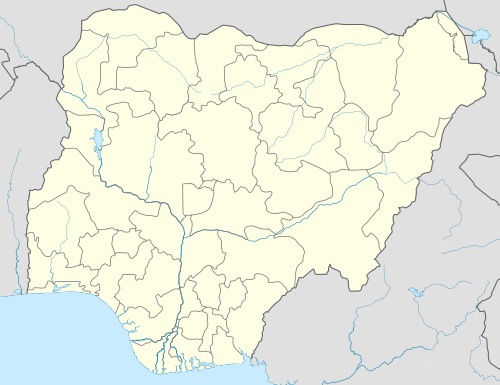Oke-Onigbin
Oke-Onigbin is a community in the heart of the Isin Local Government Area, Kwara State, Nigeria. It is mostly inhabited by Igbomina people.
Oke-Onigbin | |
|---|---|
Town | |
 Oke-Onigbin Location in Nigeria | |
| Coordinates: 8°13′0″N 5°0′0″E | |
| Country | |
| State | Kwara State |
| Local Government Area | Isin, Nigeria |
| Time zone | UTC+1 (WAT) |
Traditions
Oke-Onigbin, formerly referred to as Oke, was renamed by the Alaafin of Oyo in an era during which the town paid homage to the ruler with a basket full of snails in the dry season. The town is believed to have been named because of its abundance of snails. Thus "oke" in the Yoruba language refers to a hill or upland, while "oni" signifies possession and "igbin" means snail(s).
During the reign of Aniyaloye, the king's title changed from "Bara" to "Onigbin." In return, the Alaafin presented him with the type of traditional cap (Abeti Aja) worn by the Alaafin and a statue (Awore) wearing the same cap to immortalize the gesture.
The founder of modern Oke-Onigbin, "Baba Akoo", was said to have migrated from another Igbomina settlement known as Ikosin. This was because of a misunderstanding about who would become the next king of the town. "Baba Akoo" wanted to avoid an intertribal war. He settled in what was then Oke Igbo with his wife. He then erected a staff in front of his house, on which he typically hung his hunting pack. After moving in, Akoo's wife asked him who would be the mediator between the two of them during any quarrels as no third party was available. He said to his wife that if she ran to the staff during a quarrel, he would no longer touch her. The staff is now referred to as "Igi Dudu". That is the origin of the phrase "Igi Dudu Keta Opo," which means "Igi Dudu makes up the third person," referring to the staff's role as the third party in the event of an argument between Akoo and his wife. After many years of living together, they were joined by one of the in-laws from Ora, who was the Aros in Aro's compound.

The community had a shrine dedicated to the god Shango, the god of thunder. However, this was abolished in 1969[by whom?] and the town then had only two recognized religions: Christianity and Islam. The practice of other religions in the town was not permitted until later.[1]
Past rulers
The town has a traditional ruler known as Bara, previously known as Onigbin. The office of traditional rulers in Oke-Onigbin is rotated among the ruling families who are descendants of Baba Akoo. When a ruler dies, another ruler is chosen[by whom?] from the ruling family that is next in line, according to the historical records of the town.
The first ruler was Baba Akoo himself, the founder of the town and ruling house called Bara Ile Nla. He was succeeded by his son, Egbaraojosan Bara from the Ile Nla Ruling house, and then by Aniyaloye.
The lineage of Baba Akoo is in Ile Nla compound where Baba Akoo settled and Odo Oja compound. These are the two descendants of Baba Akoo who were entitled to the throne of Onigin. After some time the two houses agreed that the descendants of Baba Odumo (the elder brother of Baba Ako) be allowed to join the ruling house. The two towns were merged as Oke Onigbin. The fourth house (unrelated to Baba Akoo) came after the candidate who was imposed on the town by the then lord of the town (the Ilorin Emirate.[2]
Contemporary religions
The Kwara State has numerous Muslims, and Oke Onigbin has one of the largest central mosques in the state. It also has congregations of several Christian denominations, including the Evangelical Church of West Africa (ECWA) and All Saints, an Anglican church.[3]
References
- Gigi Pezzoli (1995). Cavalieri dell'Africa: history, iconography, symbolism. Centro study archeology African.
- "Councilors in the 16 LGs of Kwara State charged to collaborate with relevant Agencies". Radio Kwara. Archived from the original on 2010-01-02. Retrieved 2009-11-26.
- "Clergy Locations" (PDF). Church of Nigeria Anglican Communion. Archived from the original (PDF) on 2011-01-14. Retrieved 2009-11-26.